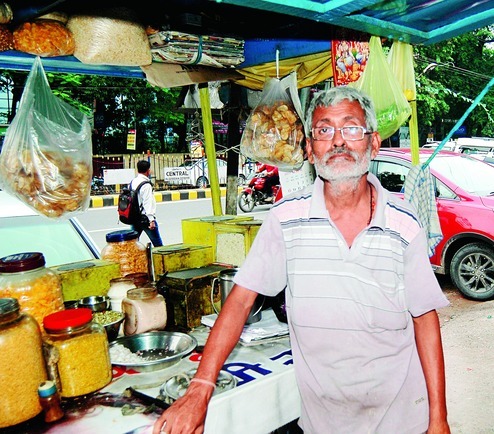
Munna Lal Prasad, 58, who sells bhuja, sattu and other snacks from his cart on Fraser Road
• November 8, 2016: Prime Minister Narendra Modi announces demonetisation of Rs 500 and Rs 1,000 denomination notes as a step to fight black money, corruption, terrorism, counterfeit.
• August 30, 2017: The Reserve Bank of India says people deposited 99 per cent of demonetised notes in banks. Finance minister Arun Jaitley says direct taxes are up, money has come to the banks, and announces that the central government will now curb the use of black money in elections.
But...
Munna Lal Prasad, 58, who sells bhuja (roasted grains), sattu (roasted gram flour) and other snacks from his small cart on Fraser Road gets edgy whenever he is reminded of demonetisation.
' Bhagwan aisi tabaahi dobaara na kare (May god never bring such a disaster again). My business was hit so badly that it is yet to recover the losses incurred after demonetisation. It seems people have lost interest in eating bhuja and drinking sattu after demonetisation,' said the Siwan native, a retrenched employee of Bihar State Textbook Publishing Corporation.

Santosh Kumar Agarwal of New Ankur Furnishers, a home décor shop on SP Verma Road.
Pictures by Ashok Sinha
'Soon after the notebandi, my sales nose-dived. Customers came in lesser numbers and those who came bought less because they did not have enough cash in their hands. To add to the existing woes my daughter was to get married early December and we did not have enough cash. The bank in my village wasn't ready to give me more than Rs 2,000 cash per person.'
The bhuja-seller had several rounds of altercations with bank officials to withdraw his savings that he had made for his daughter's wedding for the past 22 years. The bankers gave him the idea to transfer the money into accounts of his relatives and then get it withdrawn to get the cash needed for the marriage.
It is not only small businesses that suffered after the November 8 decision, but the big ones in Patna are also ruing the turn of events and waiting in the hope of a better tomorrow.
Santosh Kumar Agarwal of New Ankur Furnishers, a home décor shop on SP Verma Road, is one among them. The landmark shop has no customers and he bluntly blamed it on demonetisation.
'There's a fall of almost 70 per cent in footfall at present compared to pre-demonetisation days. I agree home furnishing is not an essential product, but the sale is definitely down these days. I cannot pinpoint the reasons because there is no liquidity crunch now. I hope the sales pick up soon,' Santosh said.
He added that his shop has always been giving discounts to customers, so he could not use it this time to attract customers. 'People have become cautious in buying luxury items after demonetisation,' he said.
'The RBI is now saying that 99 per cent of demonetised notes were deposited. This means either there was no black money in the system or demonetisation failed to have any affect.'
There are, however, some businesses that have managed to overcome the demonetisation blues. Chhabra Sports Agencies is one of them.
Co-owner of the agency Rahul Chhabra said: 'Demonetisation is past. We have forgotten it. Our business is back to normal.'
Rahul, however, conceded that demonetisation hit them badly as it came before the winters, which is considered the peak season for sale and purchase of sports goods. 'We found that not a single track suit was sold during previous winter.'
Trade bodies are coming up with their own opinions over the 'demonetisation debacle', as Opposition parties across the country are calling it. Bihar Chamber of Commerce and Industry (BCCI) president P.K. Agrawal said demonetisation affected everybody, but 'businessmen have a tendency to call their own losses the worst.
The impact on gold-silver jewellery business, manufacturing units, businesses-based on cash transactions, shops selling consumer durables, luxury items was the worse. Traders have reported that the frequency of fake currency notes being passed into their hands has come down,' Agrawal said.
On the RBI report, Satyajit Singh, the managing director of Shakti Sudha Industries and chairman of the Bihar committee, PHD Chamber of Commerce and Industry, said: 'It has now been proved that our country is honest compared to what people thought earlier. All corporate houses are honest and the government should trust them.'
Satyajit added that agriculture, agro-based businesses and retail were the worst affected and it took them a few months to bring the situation to normalcy.
'I have a makhana (fox nut) business and I procure it from small farmers. They dealt in cash and they were badly hit, as there was liquidity crunch. I had to get their accounts opened so that money could be transferred directly to their accounts. This took three months,' Satyajit added.
He said 80 per cent business in Bihar is still cash-based and ample liquidity in the economic system has now brought the situation back to normal.











